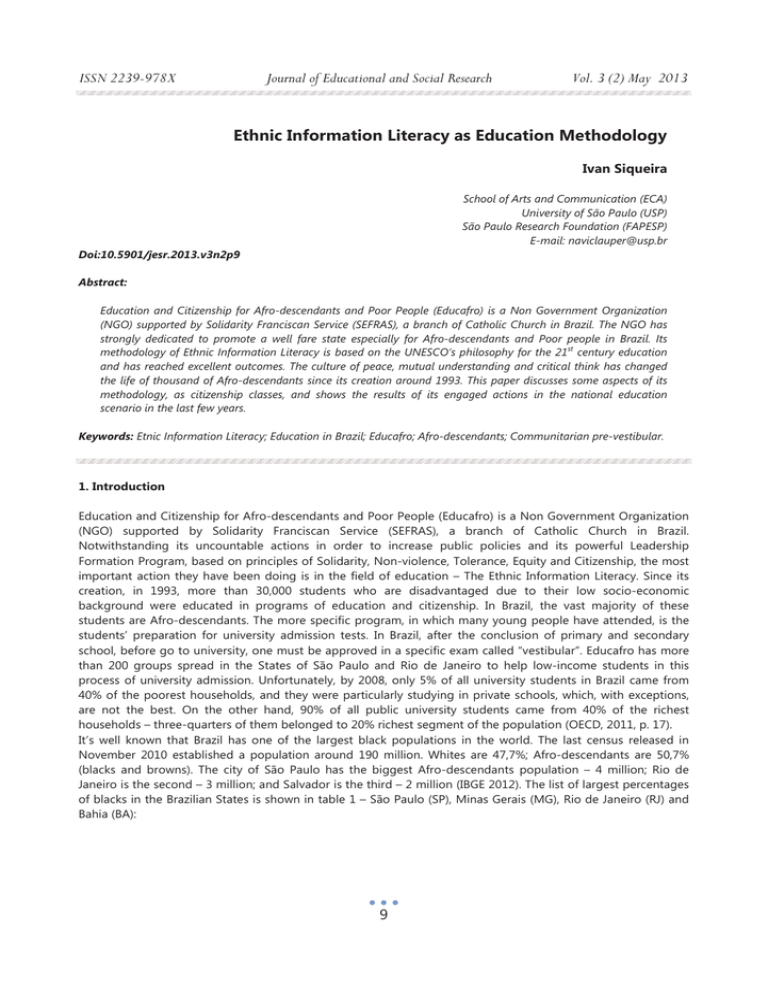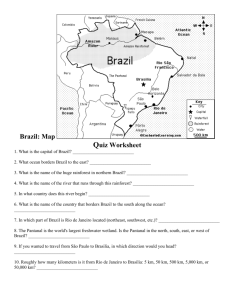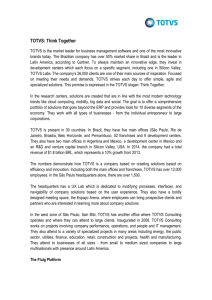Document 11945760
advertisement

ISSN 2239-978X Journal of Educational and Social Research Vol. 3 (2) May 2013 Ethnic Information Literacy as Education Methodology Ivan Siqueira School of Arts and Communication (ECA) University of São Paulo (USP) São Paulo Research Foundation (FAPESP) E-mail: naviclauper@usp.br Doi:10.5901/jesr.2013.v3n2p9 Abstract: Education and Citizenship for Afro-descendants and Poor People (Educafro) is a Non Government Organization (NGO) supported by Solidarity Franciscan Service (SEFRAS), a branch of Catholic Church in Brazil. The NGO has strongly dedicated to promote a well fare state especially for Afro-descendants and Poor people in Brazil. Its methodology of Ethnic Information Literacy is based on the UNESCO’s philosophy for the 21st century education and has reached excellent outcomes. The culture of peace, mutual understanding and critical think has changed the life of thousand of Afro-descendants since its creation around 1993. This paper discusses some aspects of its methodology, as citizenship classes, and shows the results of its engaged actions in the national education scenario in the last few years. Keywords: Etnic Information Literacy; Education in Brazil; Educafro; Afro-descendants; Communitarian pre-vestibular. 1. Introduction Education and Citizenship for Afro-descendants and Poor People (Educafro) is a Non Government Organization (NGO) supported by Solidarity Franciscan Service (SEFRAS), a branch of Catholic Church in Brazil. Notwithstanding its uncountable actions in order to increase public policies and its powerful Leadership Formation Program, based on principles of Solidarity, Non-violence, Tolerance, Equity and Citizenship, the most important action they have been doing is in the field of education – The Ethnic Information Literacy. Since its creation, in 1993, more than 30,000 students who are disadvantaged due to their low socio-economic background were educated in programs of education and citizenship. In Brazil, the vast majority of these students are Afro-descendants. The more specific program, in which many young people have attended, is the students’ preparation for university admission tests. In Brazil, after the conclusion of primary and secondary school, before go to university, one must be approved in a specific exam called “vestibular”. Educafro has more than 200 groups spread in the States of São Paulo and Rio de Janeiro to help low-income students in this process of university admission. Unfortunately, by 2008, only 5% of all university students in Brazil came from 40% of the poorest households, and they were particularly studying in private schools, which, with exceptions, are not the best. On the other hand, 90% of all public university students came from 40% of the richest households – three-quarters of them belonged to 20% richest segment of the population (OECD, 2011, p. 17). It’s well known that Brazil has one of the largest black populations in the world. The last census released in November 2010 established a population around 190 million. Whites are 47,7%; Afro-descendants are 50,7% (blacks and browns). The city of São Paulo has the biggest Afro-descendants population – 4 million; Rio de Janeiro is the second – 3 million; and Salvador is the third – 2 million (IBGE 2012). The list of largest percentages of blacks in the Brazilian States is shown in table 1 – São Paulo (SP), Minas Gerais (MG), Rio de Janeiro (RJ) and Bahia (BA): 9 ISSN 2239-978X Journal of Educational and Social Research Vol. 3 (2) May 2013 Table 1 – States with the largest populations of blacks in Brazil SP MG RJ BA Whites 63.9 45.4 47.4 22.2 Blacks 34.6 53.5 51.7 76.3 Source: IBGE (Census 2010) Historically, few students come to university in Brazil. Only around 2000 the enrollment rates in higher education exceeded 10% of population between 18 and 24 years old. But the statistic for the Afro-descendants is a tragedy. In 2001, only 1,8% of Afro-descendants were at university compared with 14,1% of whites. In 2006, the situation was 6,3% for blacks and 19,2% for whites (IPEA, 2012). In carriers with the highest social and economic value as medicine and law is almost impossible to find a single black student. An example of this extreme difficulty – in the last four years, a program of quotas for black students at Federal University of Rio Grande do Sul (UFRGS) offered 84 places for medical school but only 03 black students were enrolled (Educafro, 2012). On the other hand, index of violence, adolescence vulnerability, bad jobs and payment are sadly closed to black people. Race, class, gender, urban space and age are the components of a “geography of death”, especially for male youth Afro-descendants (Vargas & Amparo-Alves, 2009). In Salvador (State of Bahia), in the decade of 1990, 96% of all murders practice by Police was among black population. In São Paulo State, between 1996 and 2006, there was an increase of approximately 160% in the number of prisons. There is not any ethnic census for this population by we know that 75% of them had between 18 and 34 years old; 7% had concluded the secondary school and only 2% had a graduation degree (FUNAP, 2012). The Afro-descendants that live in big cities without quality-education have the greatest probability of being hit by violence and consequently appearing in statistics of premature deaths. The Map of Violence in 2012 shows that violence and murder are strongly related with age between 15 and 29 years old (Index of Vulnerability for Youth). The numbers of deaths and homicides caused by firearms in Brazil are unthinkable even when compared with war and armed conflicts, as shows table 2: Table 2. Armed Violence & Death Statistics Deaths (1980-2010) (1975-2002) (1947-2000) (1964-2000) Brazil Angola Civil-war Israel-Palestine Conflict Colombia Civil-War 1.091.125 550.000 125.000 45.000 Source: Map of Violence – Brazil 2012 Educafro has emerged to struggle against these circumstances, as a dream that came true in Rio de Janeiro, a city in which 50% of slums are black but in city’s richer districts blacks are only 7%. Firstly, it convinced private universities as Pontifical Catholic University of Rio de Janeiro (PUC-RJ) to support black students and offer discounts for their education. At the same time, Educafro provided specific programs of information literacy for black people. Since then, the number of partnership between Educafro and higher educational institutions has significantly increased. Further than that, Educafro has promote ethnic diversity in the job market, as it did with the largest private bank institution in Brazil, Itaú, with whom agreements have been made in order to promote inclusion of Afro-descendants among bank employees. With the Department Store and Hosiery Colombo an agreement was signed whereby a minimum of 20% of Afro-descendants would be hired to work in all levels of new jobs. These two last occurrences began around 2004. 10 ISSN 2239-978X Journal of Educational and Social Research Vol. 3 (2) May 2013 Educafro has also worked hard and has given a strong contribution for a new use of a nation exam (ENEM) by which students of all country can choose their graduation course in a large group of Federal Universities with only one exam. Before that, one must did an exclusively exam for each university, which produced very expensive situations. Discussions with Police and a plan of requalification and African cultural for policies are in action in São Paulo. Educafro also did a decisive participation on a nation law about Africa History and Afrodescendants in Brazil. One of the most polemical situation in which this NGO has engage was the Quote’s law – University for all (PROUNI), a national program based in 1960’s American experience of affirmative action. Between 2005 and 2010, the program has already included about 47,9% of Afro-descendants of 1.383 million available enrollments at private universities financed by Federal Government. Certainly, Educafro was not the only responsible for that enormous historic victory for the Afrodescendants but it has a massive participation especially in the last few years. A great part of its proceedings has st been based on the pedagogical philosophy placed by UNESCO for the 21 century education: 1. 2. 3. 4. Learning to know Learning to do Learning to live together Learning to be From such a perspective of value-based education, Educafro methodology has deal a constellation of attitudes in which students have found sense of dignity, creative thinking, problem-solving skill, informed decisionmaking and cooperation among others. More than teach contents and to promote a free pass to university, Educafro curricula are firmly related to the values of great contemporary relevance. Its epistemological parameters are linked with the main objectives of current day education values: socio-economic progress, material prosperity, ethical development of citizens, social critic consciousness and mutual understanding. I will explain in the next lines the methodology and the circumstances that put Educafro in advance when compared st with the results of official education and others issues related to Afro-descendants education in the 21 century in Brazil. 2. Ethnic Information Literacy Program This section shows that the essence of the Ethinic Information Literacy Program of Educafro is a mix of formal and informal learning, a framework for developing the competences and habilities for living in a global society st of the 21 Century. 2.1 Conception of a new standard of education The philosophical principles of Educafro education are similar of National Association of Black Supplementary School in United Kingdom, based on the evidences that cognitive development of black students is underestimated by the traditional school and by the fact that black students are not motivated to develop their full potential or to give the best of themselves in the studies; mostly because the Brazilian School has had little social meaning for Afro-descendants and traditionally treats them with values that do not share their history, African heritage or social conditions (Kabengele & Gomes, 2006). Blacks still struggle against social stereotypes and negative references that the school often plays about culture and physic appearances of Afro-descendants. It’s very difficult to be educated in an environment without positive self-references. Not long ago in Brazil, we rarely see black people in a prominent position on the television, magazines or other Medias, excepting soccer players or some singers of samba. This situation is the historical consequence of prejudice against black people and the legacy of injustice and inequality of more than 350 years of slavery. Moreover, the lateness of country’s abolition in 1888 and the fact that only in recent times something has been done to turn African-descendants into real citizens, compared with the conditions given to the European and Asian immigrants. The consequence is that the country systematically barred the majority of population to fully develop. 11 ISSN 2239-978X 2 Journal off Educational and Soocial Research Vol. 3 (2) May 2013 Educafro did its activities majority with volun nteers in week-endss. The classes often occur on Saturdayys (09 am to 17 pm)) and occasionally on o Monday to Frida ay (19 to 22 pm). Itt also provides texttbooks and other in nstructional materia als for teachers and students at lo ow prices. This ma aterial covers conttent of all discipliines: Math, Portuguese Language, Geography G etc. The e classes usually take t place in churches or in publicc school in n of themes alternative schedules. Among the textbooks,, there is the book of citizenship. Everry year, a collection are written from a range of o issues related to o the Afro-Brazilian perspective in labo or marked, modus operandi o of Brazilia an discrimination and prejudice again nst blacks among others. In the last two years the mo ore relevant topics are “The challenge es brought by the entrance e of black and a poor students in Brazilian Univerrsities: what policy should require the authorities?” and “The “ urgency of a process of deconsttruction of institutio onal racism toward ds true racial democracy in Brazil”. The e papers are often written by membe ers of Educafro, generally in a collabo orative way. E Educafro’s methodo ology of teaching and a learning workss together. It’s nott rarely a content be b selected after a previous discussion among teacher and students concerning about the approach, the relevan nce and the sequen nce of the topic. The students also wo ork in groups, helpin ng one another and d exchanging information and learning process: “I’ve learrned in this way” is a statement commonly heard. th S Some researchers said s the 20 centu ury showed an inw ward looking, a selff-oriented perspecttive and an egocen ntric vision of the world w (UNESCO – African Regional Conference C on Valu ues Education, 2001 1). Since its beginn ning in 1993, Educcafro has never disscriminated against poor white students, as one migh ht suppose, howeve er it always stressed d its priority by blaccks, aware that edu ucation should not be a factor of exclu usion but to promotte equal chances to all in a learning society. The curricula and epistemolo ogical aspects of itts approach reflect a particularity often denied in Brazil – that blacks are no ot suffering because e they are poor, bu ut that their sufferin ng come from the fa act that before anytthing they are black ks. st T Thus, Educafro teacches that 21 century requires among several learning ob bjects particularly actions a fully conscio ous of responsibilitties, something like e a new humanism,, a ethical behaviorr in a new world, in n which we must not n avoid contact with the other but living daily meetting of the differe ences, especially in the urban societie es. So, instead bein ng agent of exclusio on being part of a collaborative way. In fact, this is the principle of collectiive existence (civilitty) by which the id dea of modern socciety was built by FFrench Enlightenme ent: liberté, égalité,, fraternité. This does not mean that t Educafro ignores the world g globalised requires economic competition, but that it is interested in a way of thought that mutual understanding, the elim mination of discrim mination and high le evel of education fo or all Brazilian segm ments of population n will make a betterr society for everyone. An example of the t concern of stud dents of Educafro with w others low-inco ome students of Bra azil is a web tool the ey created to make e possible to check information i about all a university progra am of quotas in the e country: Figure 1. Map of affirmatiive actions in Brazil e: www.educafro.org g.br/cotas-mapa.htm ml Source 12 ISSN 2239-978X Journal of Educational and Social Research Vol. 3 (2) May 2013 2.2 New ways to measure student’s perfomance Evaluations carried out by Educafro are not only related to content but also to the attitude of students. Therefore, students must participate in citizenship activities such as going to Brasília (Capital of Brazil) to discuss with parliamentarians about quota or education funding. A group of student went to Brasília on March 25, 2012 to press the debate in the Supreme Federal Court about a law that reserve 50% of all places in federal public universities for public school students and blacks. In August, this law was promulgated by the President Dilma Roussef. Students also must put into practice what they learn, so they are motivated to find cooperative solutions for currently problem like little money to pay public transport to go to classes. Some solutions are to sell snacks, trinkets or t-shirts with African themes at monthly meeting that Educafro regularly promotes. These meetings are also part of the evaluation of a global assessment for each student. The complete structure of this assessment includes citizenship activities, for example, travel to Brasília, evaluations of subjects, monthly contribution (about US$ 15), participation in activities to solve collective or individual problem and commitment to participate in the examination in public universities. When a student gets a scholarship in private university he will automatically become a volunteer or teacher. Another difference of Educafro approach is that education process is not exclusively formed by students and teachers. In many situations, students and teachers share the process of learning with coordinators, militants, college students, professionals of several labor activities and volunteers. This education is very close to the student’s reality. They frequently see people like themselves, who won the social barriers and racial discrimination through education and hard working. Educafro also developed tools and strategies looking for a holistic development of the whole person by encouraging students to live a simple life with respect for others and nature in a way that the idea of common is more important than the idea of individual. Accordingly, although Educafro is part of Catholic Church, it promotes among the students the respect for Afro-Brazilian Religions like Umbanda and Candonblé. Unfortunately, in Brazilian Public Schools, students rarely have this diverse approach, no matter if they are blacks or whites. It’s exceptional a public school in which students learn not only subjects of math, sciences and languages but also citizenship, respect for others, their history approach – in case of blacks, opportunity to face everyday problems and help to find solution – in short, real life. The case of Educafro and its successful results in education shows that public institutions of secondary education in Brazil have a lot to change and to rethink about education in our time, especially for Afro-descendants – half of the population. If we compare the budget of public education, its structure and locations with the little funds donated voluntary to Educafro, it stay clear that education is more than a matter of financial investments. 3. The achievements of a new era In 2003, a decade after the birth of Educafro, the Rio de Janeiro State University (UERJ) was the first higher education institution in Brazil to promote a program of affirmative action for black students – more than a century after the abolition of slavery proclaimed in the same city in 1888. This required a strong participation of members of civil society including Educafro participants. The affirmative action of UERJ was the beginning of a new age for Afro-descendants in terms of education possibility in this country. At the same year, a law (Lei nº 10.639) forced the inclusion of History of Africa and Culture of Afro-descendants in primary and secondary schools – private our publics – something that in the 1960’s the black movement had already strongly stressed: “in Brazil, there’s no teaching of History of Africa or History of African outside the continent” (Nascimento, 1978, p. 154). In 2005, began the program University for all (PROUNI), in which Educafro participated with the first draft. Educafro leaders say they had presented this draft to the previous Federal Government Fernando Henrique Cardoso (1995-2003) but it only was accepted by Lula Government in 2004. In fact, the macroeconomic st stabilization in early 21 Century was favored by the consolidation of “Plano Real” in 1990s – an economic program led by President Cardoso who finally controlled inflation of prices since 1980s. The economic stabilization also allowed a better picture for Afro-descendants in the country. Since then, Educafro has played a central role in discussions about affirmative action in Brazil. The entity has often discussed these issues in a national scale. The more frequent argument is that Afro-descendants still have the worst education and that it’s impossible to the country to be a really developed and sustainable nation 13 ISSN 2239-978X Journal of Educational and Social Research Vol. 3 (2) May 2013 while half of its population is living in bad education conditions, bad security and bad working. On the other hand, Educafro always discussed with important newspaper, like “Folha de São Paulo” and “O Estado de São Paulo” that the huge part of the black population has been criminalized or excluded, having its future denied by a silent action that still persist between some important segments of society. Despite bad statistics of premature deaths and bad public education, it seems that paradoxically Afrodescendants in Brazil have never seen a period of hope and great expectations. The economy is under control, the growth rates of the country are sufficient to maintain the jobs and salaries like a long time ago people did not see. Statistics show that about 30 million have abandoned poverty in the Lula Government (2003-2010) and migrated to a new social class, the called “Classe C” – a lot of them are Afro-descendants. In 2011, the economic class C was about 54% of the population, their income was about US$ 850 per month. Even the poorest classes D and E had an income near of US$ 700 per month. Around 44% of all Brazilians had access to internet, although 86% of classes D and E had not yet (O Observador, 2012). The new steps of Educafro are to create new possibilities to amplify hope and better education to Afrodescendants and poor white students through web tools. The entity has already formed a franchising to enlarge the index of inclusion of Afro-descendants in marked labor. The most important is that their understanding of education includes contents, ethic values and respect for others, living with the difference, good job and hope – not by chance the coordinators of Educafro are Franciscans. 4. Concluding remarks This paper analyzed the new circumstances of education in Brazil for the Afro-descendants after the appearance st of affirmative actions in the beginning of 21 Century and showed the leading role of Educafro with its Etnic Information Literacy Program. The methodology of Educafro has innovated by join contents, citizenship, humanism values, technology and hope as tool to include the poorest segments of population in higher education. The philosophy of Educafro has similarities with other NGO worried with the destiny of new generations of African-descents out of Africa, like National Association of Black Supplementary School in United Kingdom or other in Brazil – Geledés: Institute of Black Woman, Uneafro Brazil and others. It’s undeniable that blacks still suffer the worst living conditions in Brazil. Besides that, the long battle of Afro-descendants throughout the history of this country starts to show more concrete outcomes in large scale. Educafro is part of the struggle that toppled in combat countless others Afros. References Brazilian Institute of Geography and Statistics (IBGE). Censo 2010. Retrieved from www.ibge.gov.br on 2012, February, 10th. Institute of Applied Economic Research (IPEA). Escolaridade. Retrieved from www.ipea.gov.br on 2012, February, 10th. Munanga, K. & Gomes, N. (2006). O negro no Brasil de hoje. São Paulo: Global. Nascimento, A. (1978). O genocídio do negro brasileiro. Rio de Janeiro: Paz e Terra. OECD (2011). Higher Education in Regional and City Development: State of Paraná, Brazil 2011. Retrieved from www.oecd.org/publishing on 2012, February 10th. O Observador. Brasil 2012. (2012). Retrieved from http://oobservadorbrasil.blogspot.com.br on 2012, March, 10th. Secretaria de Educação. (1988). Salve 13 de maio? São Paulo: Secretaria da Educação. Vargas, J. & Amparo-Alves, J. (2009). ‘Geographies of death: an intersectional analysis of police lethality and the racialized regimes of citizenship in São Paulo’, Ethnic and Racial Studies vol..33 Issue 4, p. 590-610. 14





